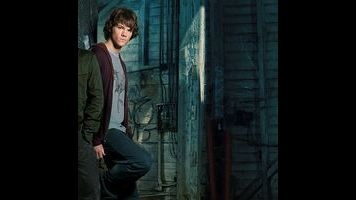Supernatural: “Adventures In Babysitting”

Happy New Year, Supernatural fans! Zack sends his regards, but he's still a little too broken up over Bobby's death to give this show the thought and attention it deserves without sobbing uncontrollably. I can't say that seeing Jim Beaver leave yet another series with his forehead in more pieces than it had been when he'd signed on was exactly what I needed to get myself in the proper frame of mind for the holidays, but it was a brave move and the right thing to do for the show, especially if they don't find some magical mumbo-jumbo bullshit way to bring him back from the dead, maybe hand-in-hand with Castiel. Supernatural has scheduled the apocalypse on its calendar in ink, only to have the boys step in and break it up at the last minute, more than a couple of times now, and that means that extraordinary measures were needed to make the viewers feel that this time, the danger was real and sacrifices would have to be made.
Killing off beloved characters, right after strongly hinting that one of them was starting to look pretty good to the local lady constable and might want to spring for some Listerine, is one of the better ways of achieving that effect. And apart from the affection that viewers had invested in Bobby Singer over the years, killing him off really does serve to make Dean and Sam seem lonelier than ever, cut adrift in the dark without their support network, in a way that the death of their father never really did. When John Winchester had his big farewell moment, saying goodbye to the son who didn't know that John had already agreed to die and go to Hell to save him, the emotions that the show must have hoped to stir up were somewhat undercut by the fact that it was hard for a seasoned TV watcher to not recognize that the real reason John was being ushered back out of his sons' lives was that Jeffrey Dean Morgan didn't think he was helping his burgeoning movie career by hanging around the set of a TV series where he wasn't the star and was supposed to be the father of an actor who was all of twelve years his junior.
Somehow, his hasty exit rhymed with the conception of John Winchester as an absentee dad who'd only been enough of a presence in his sons' lives to screw them up and bequeath to them a way of life that's eventually going to get them unpleasantly killed. I don't know how much of this was planned and how much of it just grew out of the rapport between Jim Beaver and the two leads before the writers picked up on it and put it to work for them, but the more Beaver put his stamp on the show, the more the surrogate-father relationship became its emotional core, to the point that the heroes' real father, who was originally conceived as a towering, unseen figure in their lives, was reduced to a name whose invocation was always good for a comic shudder. (Now, with all the boys' tender parental emotions connected to Bobby, John is basically to Supernatural what the mostly unseen, often-quoted Pappy was to Maverick, if Pappy had beaten Maverick with a leather strap every day of his childhood and stolen the girl he wanted to take to the school dance.)
The first post-Bobby episode of Supernatural quickly established that the show is more interested in exploring that lonely chill of orphanhood than in hustling in some new characters to provide the heroes with some aid and comfort. Well, maybe some aid, but not much with the comfort. Right now, the Winchesters' chief ally in the battle against the smooth yuppie super-villain Dick Roman and his legion of Leviathans is Frank, the paranoid conspiracy freak whose standard method of greeting visitors is to demand that they prove they are who they say they are, at gunpoint. Kevin McNally, who plays Frank, actually gives this episode its liveliest moments. Frank isn't a hunter, and though he has his own skill set that makes him useful to people like the Winchesters, there's no brotherly understanding between them, or even much mutual respect for their calling or sympathy over what it's done to their personalities and private lives. Frank is all crank, and McNally knows how to get laughs out of his singular world view and the blown fuses in his mental wiring without making his just seem unappealing and weird. (When he and Dean are out in the middle of nowhere, working undercover as a phone company repair crew, Frank orders Dean to get into a cherry picker and try to look busy. Why me, Dean wants to know. (Frank points to the tag on the front of his costume and says, reasonably, "This one says, 'Manager', that one says, 'Technician!'")
 Keep scrolling for more great stories.
Keep scrolling for more great stories.
